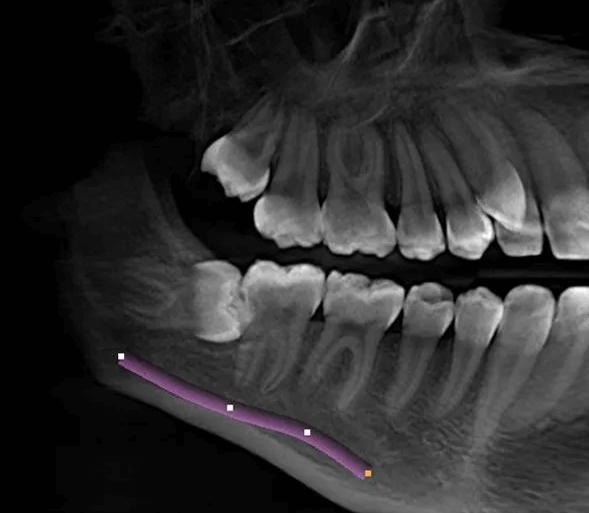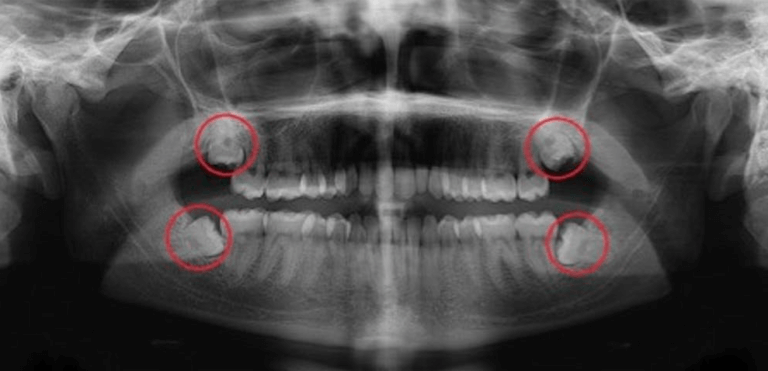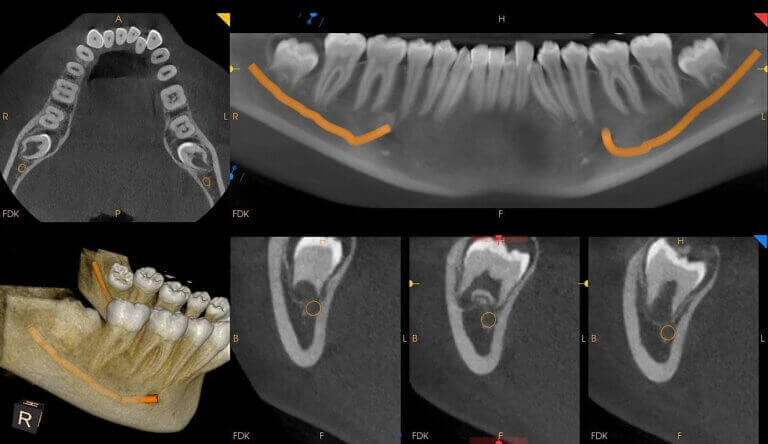CBCT Scans For Wisdom Teeth

In dentistry, the pursuit of precision and effectiveness in diagnosis has led to remarkable x-ray imaging advancements, and one such breakthrough is the utilization of Cone Beam Computed Tomography (CBCT) scans for evaluating wisdom teeth. Wisdom teeth can pose various challenges, from impaction to misalignment. CBCT scans, with their three-dimensional imaging capabilities, provides a comprehensive view of the entire oral and maxillofacial region, offering unparalleled insights into the position, structure, and potential complications associated with wisdom teeth. Before you deciding on whether a CBCT Scan for Wisdom Teeth is right for you, there are some things you should know:
Table of Contents
If you have any further questions about CBCT Scans at Oral Radiology Toronto, please contact us.
What Are CBCT Scans?
Cone Beam Computed Tomography (CBCT) is a revolutionary x-ray imaging technology, providing three-dimensional views of the patient’s dental anatomy, including teeth, bones, nerves, and surrounding tissues. Unlike traditional two-dimensional X-rays, CBCT captures high-resolution, cross-sectional images by utilizing a cone-shaped beam of ionizing radiation.
The result is a detailed and accurate representation that enables dental professionals to assess anatomical structures with precision, offering a more comprehensive understanding of the patient’s oral health. This remarkable capability makes CBCT an invaluable tool in the assessment of various dental conditions, including the evaluation and management of wisdom teeth removal.
What Are Wisdom Teeth?
Wisdom teeth, also known as third molars, are the last set of molars located at the back of the mouth. Typically, these teeth emerge in late adolescence or early adulthood, usually between the ages of 17 and 25. While some individuals may experience the eruption of wisdom teeth without any issues, many others encounter complications due to a variety of factors. One common problem is impaction, where the wisdom teeth do not have enough space to fully emerge or develop properly within the jaw. This can lead to various issues such as pain, swelling, infection, and potential damage to adjacent teeth. Wisdom tooth removal may be recommended. Given the potential challenges these molars pose, assessing their position, structure, and potential impact on oral health is crucial. CBCT scans play a pivotal role in providing a comprehensive understanding of the wisdom teeth’s anatomy and aiding dental professionals in making informed decisions regarding treatment strategies and interventions.

Why Do I Need A CBCT Scan For Wisdom Teeth Removal?
Understanding the intricacies of wisdom teeth and their impact on oral health often requires a more detailed and precise diagnostic approach than traditional dental imaging methods can provide. This is where CBCT scans prove to be indispensable. The three-dimensional nature of CBCT imaging allows for a thorough assessment of the position, orientation, and development of wisdom teeth, offering insights prior to tooth removal that may be elusive with conventional Panoramic X-rays.
- Precise Assessment of Tooth Positioning: CBCT scans offer a detailed view, enabling dentists to accurately assess the position, orientation, and depth of wisdom teeth. This information is crucial in planning the most effective extraction strategy, especially in cases where teeth are positioned close to nerves or adjacent teeth, minimizing the risk of accidental damage during extraction.
- Identification of Impaction: CBCT scans excel in identifying impaction scenarios. For instance, the imaging can reveal whether a wisdom tooth is fully erupted, partially impacted, or completely impacted beneath the gum line. This information guides the dental team in devising appropriate strategies for extracting partially or fully impacted teeth, reducing the likelihood of complications during the procedure.
- Evaluation of Root Structure: CBCT imaging allows for a clear visualization of the root structure of wisdom teeth. Understanding the root anatomy becomes crucial when, for example, dealing with curved or unusually shaped roots. This insight aids in planning the extraction process more effectively, reducing the risk of leaving behind fragments or causing unintended damage to surrounding tissues.
- Assessment of Adjacent Structures: CBCT scans provide a comprehensive evaluation of adjacent structures, including neighboring teeth, nerves, and sinus cavities. This becomes crucial in scenarios where a lower wisdom tooth is positioned in close proximity to the inferior alveolar nerve. 3D imaging helps in planning a safe extraction to avoid nerve damage postoperative complications.
- Customized Treatment Planning: Based on the detailed insights from CBCT scans, dental professionals can tailor the treatment plan to address specific complications. For example, if a wisdom tooth is found to be exerting pressure on nearby teeth, the extraction plan can be adjusted to alleviate potential damage, ensuring a smoother extraction process and minimizing the risk of postoperative complications.
- Minimization of Complications: Through a thorough assessment of the surrounding anatomy, CBCT scans assist in minimizing the risk of complications such as infections, excessive bleeding, or damage to adjacent structures. This proactive approach enhances patient safety and contributes to a more predictable and successful recovery.
- Enhanced Surgical Precision: CBCT imaging enhances surgical precision by revealing critical details about the wisdom tooth and its surroundings. This level of precision is particularly crucial when dealing with complications like irregularly positioned teeth or close proximity to vital structures, ensuring a more controlled and less invasive extraction.
- Patient Education and Communication: CBCT scans provide visual examples that can be shared with patients, illustrating potential complications such as impaction, proximity to nerves, or misalignment. This visual communication fosters a deeper understanding of the necessity for wisdom tooth removal, allowing patients to make informed decisions about their treatment and reducing anxiety associated with potential complications.
By providing a nuanced view of the anatomy, CBCT scans empower dental professionals to make informed decisions, tailor treatment plans to individual needs, and enhance overall patient care when dealing with the complexities of wisdom teeth management.

How Much Does A CBCT Scan Cost For Wisdom Teeth?
At Oral Radiology Toronto, we provide quick and convenient dental CBCT scans for busy dentists and patients in the downtown Toronto area. Our CBCT scans are useful for assessing the teeth, their supporting structures, the mandible and maxilla up to the floor of the nose.
Our competitively priced dental CBCT scans are professionally reviewed and interpreted by a Canadian licensed Oral Radiologist.
Prices are based on the size of CBCT volume:
- Small Field CBCT (most dental cases; 5x5cm): $227
- Medium Field CBCT : $306.45
- Large Field CBCT (8x8cm): $388.50
- Panoramic X-Ray: $82
Normal CBCT report turnaround time is up to 10 business days. Expedited reporting (2 business days) is an extra $50.
Please note that we do NOT offer field of views larger than 8x8cm or imaging of structures outside the maxilla and mandible, such as the temporomandibular joints, paranasal sinuses, the cervical spine, the neck and the airway spaces (i.e. craniofacial CT scan).
How Do I Get A CBCT Scan For Wisdom Teeth?
- For Referring Dentists: Refer a dental patient for a CBCT Scan using our Online Referral Form.
- For Dental Patients: Schedule a CBCT scan visit at Oral Radiology Toronto using our Online Appointment Booking System.
